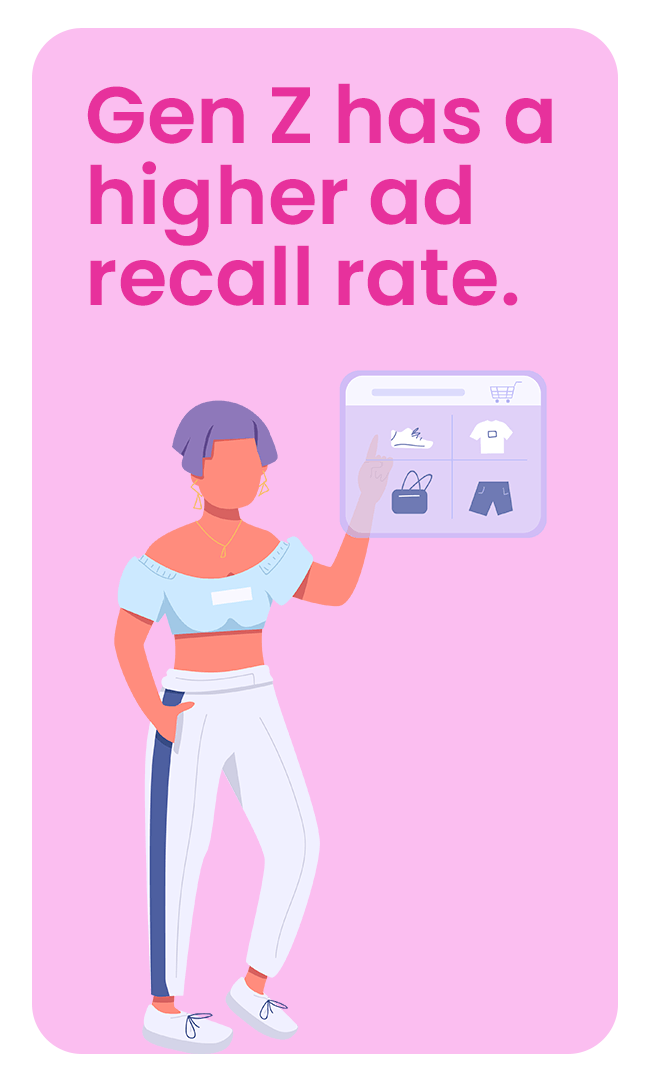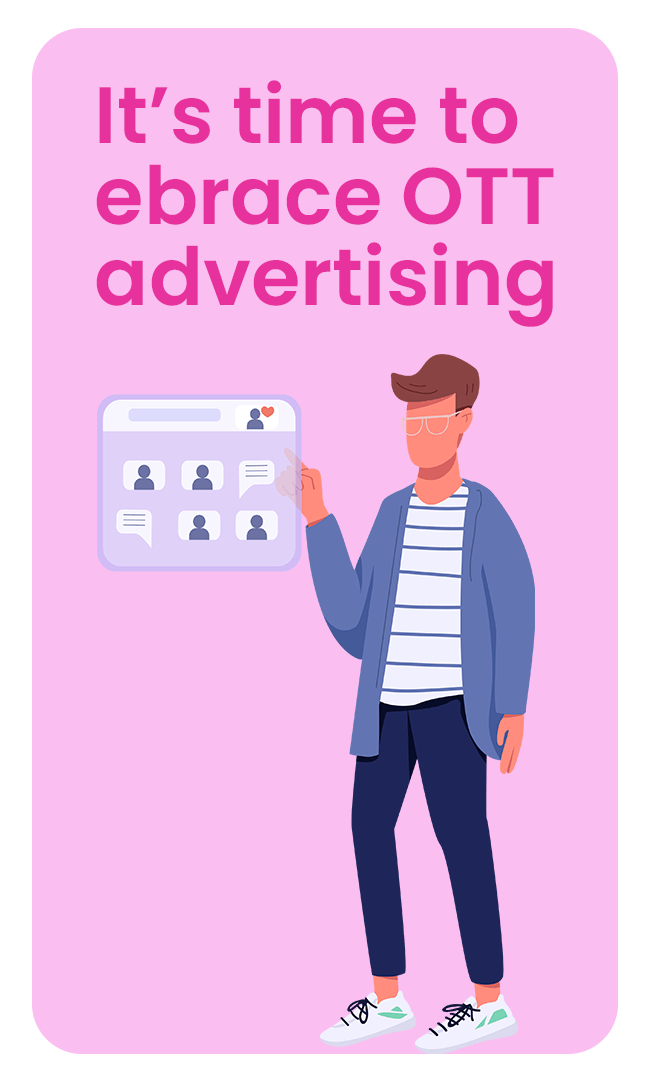Gen Z, the post-internet generation, has grown up in an increasingly virtual world. With a short attention span and a low tolerance for being sold to.
So, there’s a reason why you are reading this. You want to know how to market to Gen Z.
Contrary to popular belief they really do like ads, but only certain types of ads. We like to call these “wanted ads” because Gen Z actually wants to see them.
This article outlines the top advertising strategies to connect with Gen Z and a few examples of brands that are getting it right.
2022 Gen Z Advertising Strategies
Connection is the new currency.
Nearly half of consumers want brands to bring people together toward a common goal and even more 64% want brands to connect with them.
If you want to market to Gen Z, here are some of the advertising strategies that will work best.
Get to the point: Bumper Ads

In 2020, a global survey polled 12,000 people in six countries to better understand attention spans across generations.
The results were unexpected.
Gen Z may not seem like they’re paying attention but they have a far higher ad recall rate than any of the generations before them.
That’s great for advertisers, right?
Except that 82 percent of them admit to skipping ads whenever they can.
Bumper ads are ideal for Gen Z because they’re only 6-seconds long and they can’t skip forward, ensuring your audience sees and hears your message.
For this reason, bumper ads must be appealing to “ad skippers.” They’ll appreciate a message that is clear and able to make them laugh.
Win Brand Loyalty With Brand Values
Gen Z is very critical of who they choose to give money to; once they have a preferred brand they typically don’t deviate.
To win over their loyalty, brands need to listen to what Gen Z values and dig into how the brand aligns with that.
Be vigilant in these commitments. Brand values must align with actions consistently.
Gen Z is a large and diverse generation that isn’t afraid to call brands out and demand accountability.
Be authentic to your brand at every turn.
Influencers: Power of Peer Recommendations
60% of Gen Z look to others whom they can trust, with recommendations from family and friends bearing significant weight in their purchasing decisions.
Far more than Millenials, Gen X and Baby Boomers.
Tap into this power of peer recommendations with influencers or celebrities like professional athletes.
Where It’s At: Over The Top Advertising

A large peer-to-peer learning community and app, surveyed 1,700 Gen Z'ers, here‘s what they found.
60% of the Gen Z population is watching even more video content than they were before 2020.
40% are watching YouTube.
24% are watching over-the-top (OTT) sources like Netflix and Hulu.
Gen Z spends most of their time on Instagram (59%), Snapchat (50%), and YouTube (42%).
For brands that have yet to embrace OTT advertising and its cost-effective targeting capabilities, now is the time to diversify your channel mix.
Gen Z Advertising Examples That Got It Right
Gen Z has grown up in a world where they are constantly bombarded with advertisements.
But that doesn't mean they dislike all advertisements. There are a few types of ads that Gen Z actually does want to see.
Below are three Gen Z advertising examples that are getting it right.
Nike Winning with Gen Z
Nike continues to grow in social influence with the Gen Z population, leading the way in inclusivity and challenging gender stereotypes.
Nike leverages influencer-led content (Nike Running Club) that encourages users to sign up for a 1-kilometer challenge and alternative ways to get into running.
Gucci
Gucci set out to differentiate itself within the luxury brand category, harnessing the power of TikTok and announcing NFT partnerships with Superplastic.
SUPERGUCCI was a two-part collection in early 2022 of ultra-limited NFTs designed by Superplastic's synthetic artists Janky & Guggimon and Gucci's Creative Director Alessandro Michele.
Considering Gen Z slang for "it's good" is "it's gucci" - I would say they've successfully integrated with the audience.
Gymshark
Gymshark #BigDealEnergy Campaign met Gen Z where their interests lie — gaming and esports and leveraged the power of influencers by partnering with some of the biggest YouTube stars. Fans loved the effort put into this video.
Gen Z vs Millennials
Marketing to Gen Z and Millennials requires a keen understanding of the unique characteristics that define each generation. While both generations are known for their digital savviness, Gen Z, born between 1997 and 2012, has been fully immersed in technology and social media from an early age, making them more adept at navigating the online landscape. Millennials, born between 1981 and 1996, experienced the evolution of technology, having witnessed the rise of the internet and social media platforms. Consequently, marketing strategies for Gen Z should prioritize authenticity, inclusivity, and social responsibility, as they tend to be more socially conscious and driven by values. Millennials, on the other hand, often seek out brands that offer convenience and personalization, as well as those that align with their desire for experiences and a sense of belonging. By tailoring marketing campaigns to cater to the distinct preferences and values of each generation, businesses can more effectively engage their target audience and foster brand loyalty.
Reaching Gen Z With an Athlete's Personal Brand
1. Authenticity:
Gen Z appreciates authenticity and transparency. They are more likely to respond positively to an athlete who is genuine in their personal brand and marketing endeavors. Ensure that the athlete's endorsement feels sincere and is not just a paid promotion. The athlete should genuinely like and use the product or service they're endorsing.
2. Social Media & Digital Platforms:
Gen Z lives online, particularly on social media platforms like Instagram, TikTok, and YouTube. Athletes should leverage their personal social media accounts to reach this demographic. This could include creating engaging content like behind-the-scenes training videos, vlogs, Q&As, or challenges that incorporate the brand in a natural way.
3. Collaboration with Influencers:
Along with athletes, Gen Z is also heavily influenced by online personalities. Partnering with these influencers for collaborative promotions can tap into their significant following and extend the reach of the athlete's personal brand.
4. Social Responsibility:
Gen Z is notably socially and environmentally conscious. Athletes who stand for causes, contribute to their communities, and promote sustainability are more likely to resonate with this generation. Associating the athlete's brand with charitable initiatives or environmental efforts can help in connecting with Gen Z.
5. Interactive Content:
This generation appreciates interactive and engaging content. Consider creating campaigns that involve user-generated content, like asking fans to participate in a challenge, create a TikTok dance, or design a new product. This not only engages Gen Z consumers but also helps to amplify the reach of the campaign.
6. Personal Connection:
Gen Z values a personal connection with their idols. Encourage the athlete to interact directly with their fans through social media - responding to comments, hosting live streams, or even following back fans. This direct interaction can foster a stronger connection between the athlete, their fans, and the associated brand.
7. Mobile-First Approach:
Most Gen Z consumers use their smartphones to access content and shop online. Make sure that all content, websites, and shopping platforms are mobile-friendly.
8. Use of Visuals and Short-form Content:
Gen Z's attention span tends to be shorter due to the abundance of content available. Using visuals, infographics, short videos, or GIFs can be more effective in getting their attention. Platforms like TikTok and Instagram Stories are ideal for this kind of content.
9. Celebrity Collaborations:
Many Gen Z individuals are also captivated by musicians, actors, and other celebrities. Pairing an athlete with a celebrity from another industry for a collaborative promotion can generate significant buzz and reach a broader audience.
Remember, no matter the strategy, the key is to ensure that any marketing efforts using an athlete's brand align with the interests, values, and communication preferences of Gen Z.
Learn more about how an Athlete Branding is the Key to Successful Marketing and a Comprehensive Guide to Athlete Branding
Final Thoughts
So, are you doomed and there is no way to reach Gen Z? Of course not.
Understanding what Gen Z wants from brands will help advertisers to create more effective ads and marketing campaigns.
As much as this generation’s desire for instant gratification differs from that of other generations, the underlying need to connect with values and causes remains the same across all generations.
Above we’ve outlined a few advertising strategies and shared examples of brands doing it right.
Got questions?
Hit the pink chat box in the bottom right hand corner and a Colormatics team member will be happy to walk you through the production process.


